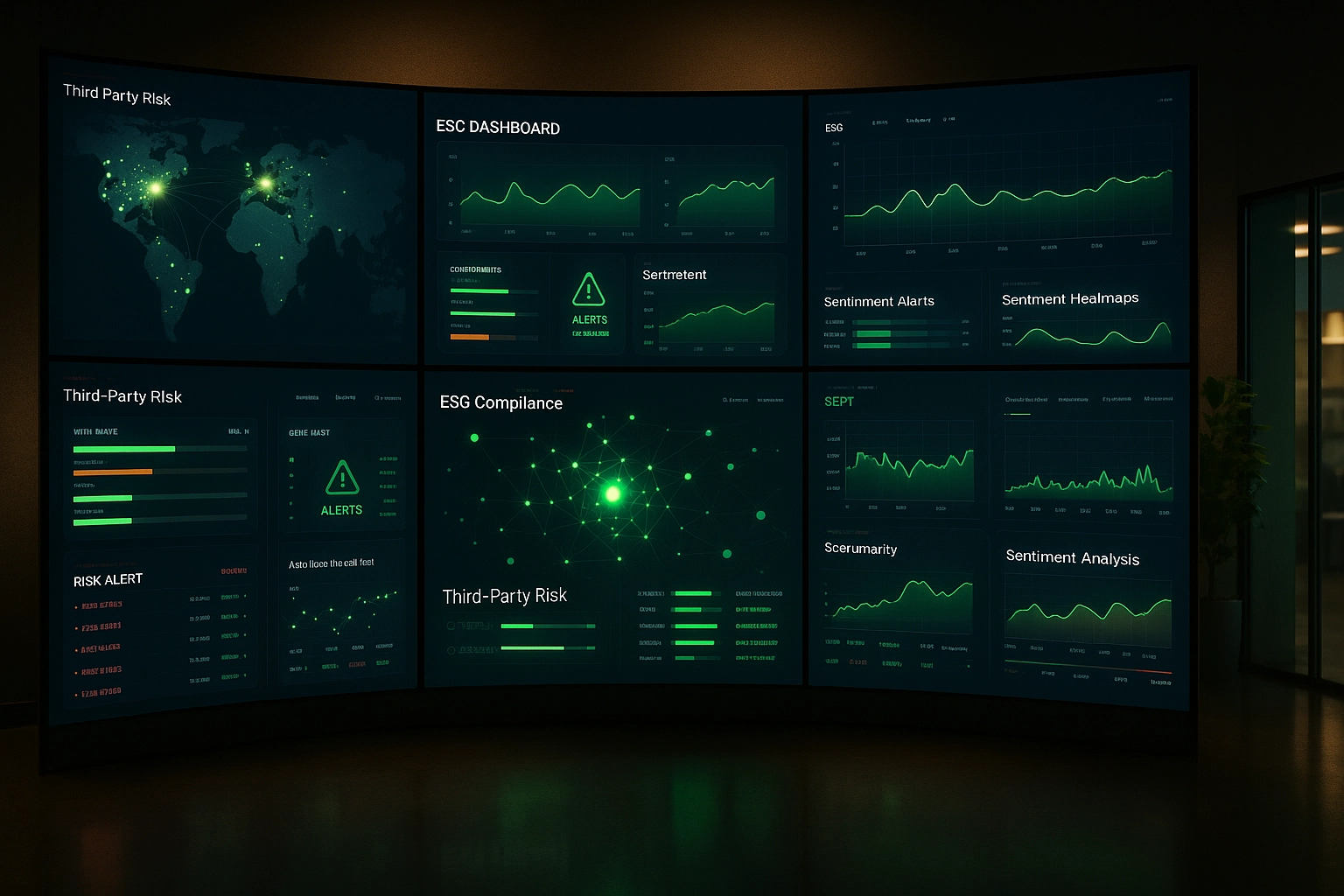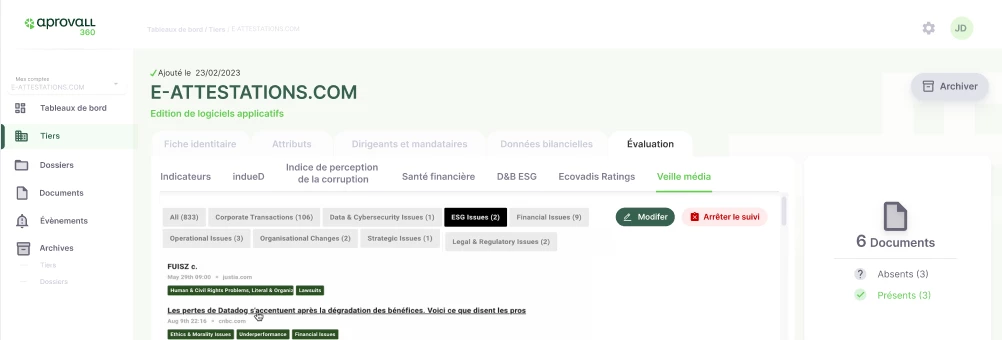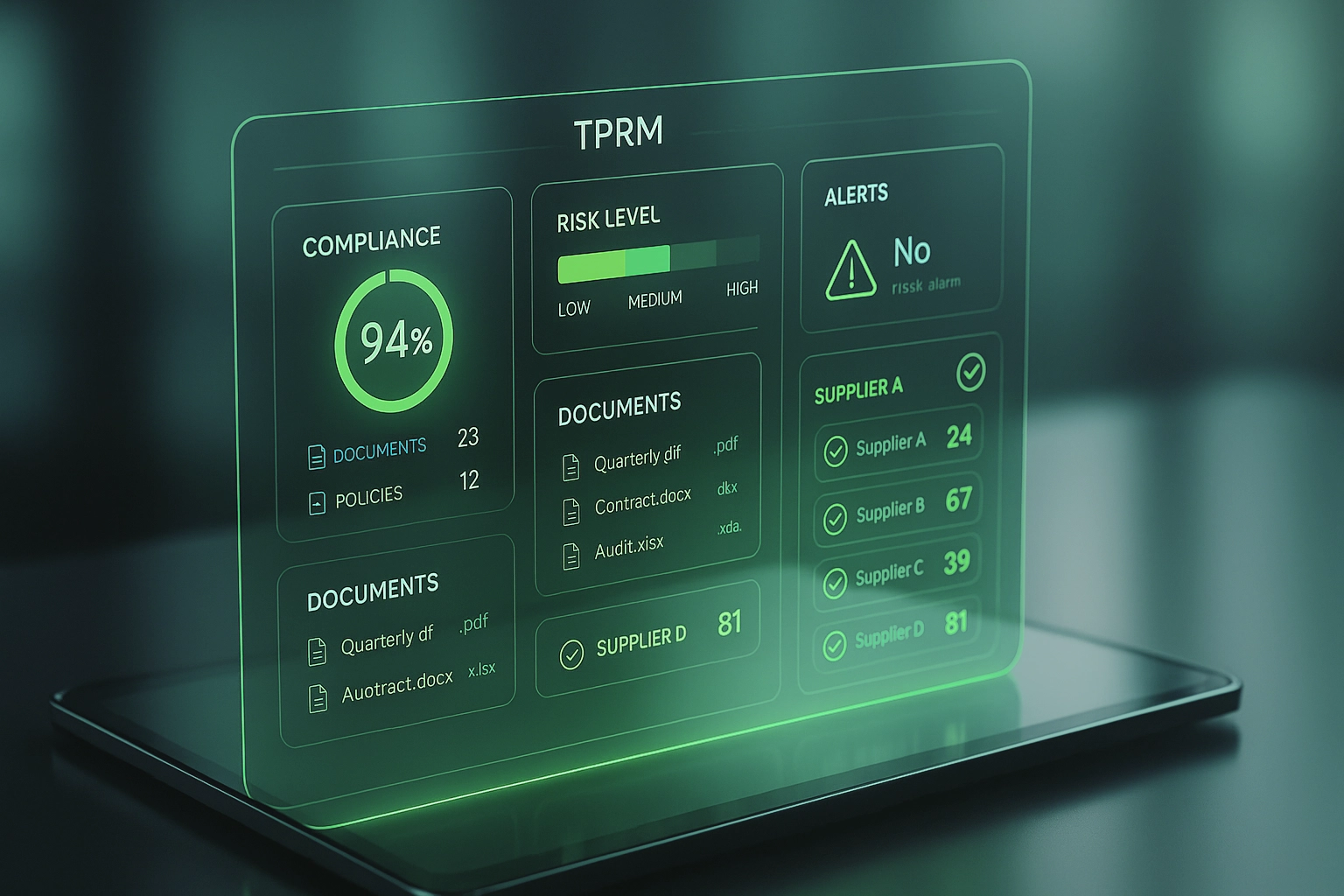Why integrate media monitoring into your third-party evaluation?

With the rapid acceleration of digital information and the proliferation of media sources, real-time monitoring of your third-party partners’ media presence has become a critical strategic issue. Media monitoring is now an essential part of collaborative evaluation processes for any analyst seeking a comprehensive view of third-party risk.
Whether the information is positive or negative, it plays a decisive role in decision-making and helps sharpen third-party governance analyses. However, manual research and online analysis are time-consuming and require deep expertise. This is why automating media monitoring and integrating it into Third Party Governance, Risk & Compliance (TPGRC) solutions is essential.
Since 2020, many companies have strengthened their use of media intelligence to monitor brand reputation and anticipate potential crises. One study found that 85% of companies integrating media monitoring into third-party evaluation reduced the impact of crises through faster, more coordinated responses. In a world where information spreads at lightning speed, a proactive approach to monitoring partner news is now vital.
The Role of Media Intelligence in Strategic Third-Party Analysis
Rising Complexity of Digital Information
The growth of digital media has made access to information faster — but its processing more complex. With weak signals, negative coverage, and media noise, it becomes harder for analysts to identify what truly matters for third-party risk evaluation.
Media consumption has increased dramatically in recent years, with a 60% rise in time spent watching video content at home. This shift has prompted businesses to expand their media presence, multiplying the volume of information that needs monitoring.
Critical Impact on Decision-Making
Media content — whether positive or negative — is a key factor in managing supplier risk. Overlooking an article revealing ethical controversies, environmental violations, or a cyberattack could seriously damage your supplier relationship. Conversely, being alerted to a partner’s achievements or innovations can strengthen your collaborative governance strategy.
Go Further
To explore the fundamentals of this approach, read our guide on Third Party Risk Management (TPRM).
Automating Media Monitoring for Effective TPGRC
The Case for Automation
Given the overwhelming volume of data, automation is no longer optional. Integrated media monitoring within your TPGRC platform enables real-time filtering of data, surfacing only insights relevant to third-party risk evaluation.
In 2024, third-party cyber risks accounted for 35.5% of data breaches, highlighting the scale of risk linked to external partners. This statistic underscores the importance of continuous, automated monitoring, including media sources.
Advanced Monitoring Capabilities
With an advanced platform like Aprovall360, media intelligence enriches third-party evaluations in real-time, scanning millions of primary and secondary sources. This system enables you to:
- Detect relevant signals without being overwhelmed by noise
- Monitor critical supplier news continuously
- Distinguish weak signals from background noise to avoid misinterpretation
- Automate press analysis for significant time savings
Sector-Specific Applications of Media Monitoring
Public Sector: Enhanced Regulatory Oversight
In public procurement, automated media monitoring helps track vendor compliance with legal frameworks and quickly identify GDPR-related noncompliance. Local authorities can proactively detect controversies and maintain the transparency expected by citizens.
Read our case study on deploying TPRM in the public sector.
Construction: Subcontractor Monitoring
In construction, media monitoring is especially valuable for identifying risks tied to multi-tier subcontracting. It helps detect HSE noncompliance, financial instability, or environmental controversies that could jeopardize project timelines.
Learn how to strengthen your decarbonization strategy in construction through continuous partner monitoring.
Industry: Supply Chain and REACH Compliance Monitoring
For industrial sites subject to ICPE regulations or handling hazardous substances under REACH, media monitoring can help identify cyber risks or environmental violations by suppliers — a vital component in maintaining operational resilience.
Explore our guide to evaluating supplier cybersecurity risks.
Retail: International Marketplace Monitoring
In retail, companies use media surveillance to assess e-commerce risks and product compliance on international marketplaces. This monitoring allows them to anticipate reputational crises and preserve consumer trust.
Décisions plus éclairées et analyse enrichie
Paramétrage intuitif et alertes personnalisées
Aidé d’un paramétrage intuitif, les analystes peuvent adapter les critères de recherche et recevoir des alertes contextualisées en fonction des sujets clés : environnement, RSE, cybersécurité, conformité NIS 2 ou DORA. L’intégration d’une veille média dans votre TPGRC permet ainsi d’anticiper les risques et de réagir rapidement en cas de crise.

Allez plus loin
Pour comprendre l’impact de ces réglementations, consultez notre analyse sur DORA et NIS 2.
Intelligence artificielle et analyse prédictive
L’intelligence artificielle documentaire d’Aprovall360 détecte automatiquement les tendances et alertes importantes, permettant une évaluation prédictive des risques. Cette approche révolutionnaire transforme la gouvernance des tiers en un processus proactif et intelligent.
Découvrez comment l’intelligence artificielle révolutionne la gestion des risques tiers.
Tangible Benefits for Your Organization
Operational Optimization
- Time savings: Eliminate manual research — key insights are extracted automatically
- Improved decision-making: Clear visibility of opportunities and threats in your partner ecosystem
- Better user experience: Streamlined navigation via an intuitive interface
- AI utilization: Advanced algorithms detect trends and trigger relevant alerts
Stronger Regulatory Compliance
Integrated media monitoring simplifies compliance with CSRD, NIS 2, and DORA, providing full traceability of the information collected on your critical partners. This ensures continuous, documented due diligence.
Monitor Your Third Parties in Real Time with Aprovall360
Aprovall360, Aprovall’s TPGRC solution, allows you to embed media monitoring directly into your third-party profiles. With instant access to relevant articles and optimized source analysis, you stay ahead of the news across your ecosystem of 450,000+ managed third parties worldwide. However, moving from TPRM to TPGRC requires tools built for the challenges of 2025.
With EUCS certification underway and proven expertise in collaborative evaluation, Aprovall360 ensures European data sovereignty while optimizing your third-party governance.
Transform Third-Party Governance with Smart Monitoring
Integrate media monitoring into your supplier risk management today with Aprovall360. Turn your approach to third-party governance into a smart, automated process — and stay in control.
These articles might interest you
-
 25 June 2025Manage Your Supplier Assessments by Context and Project for a 360° ViewSolutionsUnlock the Power of Context-Based Evaluations: Gain Clarity and Impact Supplier assessments are often structured as a top-down relationship: from the client (or buyer) to a panel of suppliers. However, these suppliers frequently operate within shared contexts — whether that’s a product, a contract, or an entire supply chain. Managing third-party evaluations by context gives […]
25 June 2025Manage Your Supplier Assessments by Context and Project for a 360° ViewSolutionsUnlock the Power of Context-Based Evaluations: Gain Clarity and Impact Supplier assessments are often structured as a top-down relationship: from the client (or buyer) to a panel of suppliers. However, these suppliers frequently operate within shared contexts — whether that’s a product, a contract, or an entire supply chain. Managing third-party evaluations by context gives […]Read more
-
 06 January 2025TPRM: The Fundamentals and the Shift Toward Integrated GovernanceSolutionsIs your organization ready to handle a major cyberattack targeting one of your critical suppliers? In 2024, the breach at Change Healthcare exposed sensitive medical data of 190 million Americans and paralyzed healthcare systems for weeks—demonstrating just how vulnerable modern supply chains are. This wasn’t an isolated incident: 61% of organizations experienced a third-party data […]
06 January 2025TPRM: The Fundamentals and the Shift Toward Integrated GovernanceSolutionsIs your organization ready to handle a major cyberattack targeting one of your critical suppliers? In 2024, the breach at Change Healthcare exposed sensitive medical data of 190 million Americans and paralyzed healthcare systems for weeks—demonstrating just how vulnerable modern supply chains are. This wasn’t an isolated incident: 61% of organizations experienced a third-party data […]Read more
-
 14 February 2025Supply Chain and Cyber Risks: How to Protect Your Supply Chain?SolutionsThe digital transformation of supply chains creates new opportunities but also exposes organizations to growing vulnerabilities. In 2025, third-party compliance assessment and management becomes a major strategic issue as 45% of global organizations will have suffered supply chain attacks, three times more than in 2021. Given this shift, third-party governance has become a top priority, especially in critical sectors such as […]
14 February 2025Supply Chain and Cyber Risks: How to Protect Your Supply Chain?SolutionsThe digital transformation of supply chains creates new opportunities but also exposes organizations to growing vulnerabilities. In 2025, third-party compliance assessment and management becomes a major strategic issue as 45% of global organizations will have suffered supply chain attacks, three times more than in 2021. Given this shift, third-party governance has become a top priority, especially in critical sectors such as […]Read more
-
 24 March 2025Pooled Due Diligence: A Strategic Lever for Third-Party Risk ManagementSolutionsIn an increasingly demanding economic environment, companies are turning to pooled due diligence processes to optimize third-party governance and strengthen their operational resilience. This collaborative approach involves sharing the efforts and resources related to third-party partner assessments, particularly critical suppliers. By centralizing these tasks, organizations—both within the same group and even among competitors—can increase efficiency […]
24 March 2025Pooled Due Diligence: A Strategic Lever for Third-Party Risk ManagementSolutionsIn an increasingly demanding economic environment, companies are turning to pooled due diligence processes to optimize third-party governance and strengthen their operational resilience. This collaborative approach involves sharing the efforts and resources related to third-party partner assessments, particularly critical suppliers. By centralizing these tasks, organizations—both within the same group and even among competitors—can increase efficiency […]Read more

